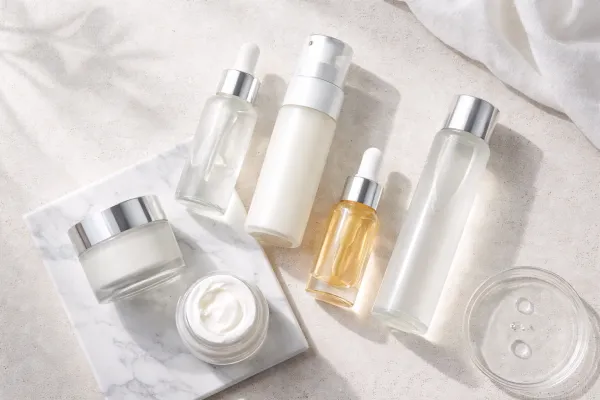Effective Skincare Routine for Scars: Heal and Restore Your Skin's Natural Glow
Discover an effective skincare routine to heal scars and restore your skin's natural glow!

Having scars can be tough, but a good Skincare Routine for Scars can help your skin heal and shine again.
This article will guide you through understanding scars, the right steps to take care of them, and the best ingredients and treatments to use.
Whether you have acne scars or other types, these tips can help you restore your skin's natural glow.
Key Takeaways about Skincare Routine for Scars
- Identify the type of scars you have to choose the right treatment.
- Always cleanse, moisturize, and protect your skin with sunscreen.
- Look for effective ingredients like retinoids and Vitamin C in your products.
- Consider natural remedies like aloe vera and rose-hip oil for added healing.
- Keep a balanced diet and manage stress for overall skin health.
Understanding Different Types of Scars

When it comes to scars, we all know they can be a real pain, especially when they remind us of past skin troubles.
Understanding the different types of scars is key to figuring out how to treat them.
Let’s break it down together!
Identifying Acne Scars
Acne scars can be tricky. They usually fall into a few categories:
- Atrophic Scars: These are the most common and look like little dips in the skin. They can be boxcar scars (broad and shallow), rolling scars (wavy), or ice pick scars (deep and narrow).
- Hypertrophic Scars: These are raised scars that happen when the body makes too much collagen while healing.
- Hyperpigmentation: Not a true scar, but these dark spots can linger after a pimple heals.
Distinguishing Between Dark Spots and Scars
It’s important to know the difference!
Dark spots are usually flat and can fade over time, while scars are more permanent. Understanding this helps us choose the right treatment.
Common Causes of Scarring
Scars can come from various sources:
- Severe acne: The inflammation can lead to scarring.
- Injuries: Cuts and scrapes can leave marks.
- Surgery: Sometimes, scars are just part of the healing process.
Scars are a natural part of healing, but knowing what type we’re dealing with can help us find the best way to treat them!
Essential Steps in a Skincare Routine for Scars

When it comes to healing scars, we all want to know the best steps to take. Here’s how we can create an effective skincare routine that helps our skin recover and glow again.
Daily Cleansing and Exfoliation
First things first, we need to keep our skin clean. Cleansing daily helps remove dirt and oil, which can prevent breakouts and further scarring. We should also exfoliate a few times a week to get rid of dead skin cells. Here’s a simple routine:
- Use a gentle cleanser every morning and night.
- Exfoliate with a mild scrub or chemical exfoliant 2-3 times a week.
- Rinse with lukewarm water to avoid irritation.
Importance of Moisturizing
Next up, moisturizing is key! Keeping our skin hydrated can help it heal faster. A good moisturizer acts like a shield, locking in moisture and nutrients. Here’s what we should look for:
- Choose a moisturizer that suits our skin type (gel for oily, cream for dry).
- Apply it right after cleansing to seal in hydration.
- Don’t forget to reapply during the day if needed!
Using Sunscreen to Protect Healing Skin
Finally, we can’t skip sunscreen! Protecting our skin from the sun is crucial, especially when it’s healing. UV rays can darken scars and slow down the healing process.
Here’s how to make sunscreen a part of our routine:
- Use a broad-spectrum SPF 30 or higher every day.
- Reapply every two hours if we’re outside.
- Even on cloudy days, sunscreen is a must!
Remember, consistency is key! Following these steps daily can help us achieve smoother, healthier skin over time. Let’s commit to this routine and watch our skin transform!
Effective Ingredients for Scar Treatment
When it comes to treating scars, we’ve got some powerful ingredients that can really make a difference. Let’s dive into what works best!
Benefits of Retinoids
Retinoids are like superheroes for our skin. They help to speed up cell turnover, which means they can help fade scars over time. They’re especially good for those discolored scars that just won’t budge.
Here’s a quick list of what retinoids do:
- Promote new skin growth
- Reduce the appearance of fine lines
- Help with acne prevention
Power of Vitamin C
Vitamin C is another must-have in our skincare arsenal. It’s known for boosting collagen production, which is essential for healthy skin. Plus, it helps brighten our complexion.
Here’s why we love it:
- Fades dark spots
- Protects against sun damage
- Gives our skin that radiant glow
Exfoliating with AHAs and BHAs
Exfoliating acids like AHAs and BHAs are fantastic for sloughing off dead skin cells. They help to reveal fresh skin underneath, making scars less noticeable.
Here’s a quick comparison:
Ingredient | Type | Benefits |
|---|---|---|
AHAs | Water-soluble | Great for dry skin, helps with surface texture |
BHAs | Oil-soluble | Penetrates pores, ideal for oily skin |
Remember, consistency is key! Using these ingredients regularly can lead to noticeable improvements in our skin’s texture and tone.
So, whether we’re using retinoids, Vitamin C, or exfoliating acids, we’re on the right track to healing our scars and restoring our skin’s natural glow.
Let’s keep our skincare game strong!
Natural Remedies to Support Skin Healing
When it comes to healing our skin, we often look for natural solutions that are gentle yet effective.
Here are some remedies we can easily incorporate into our skincare routine:
Aloe Vera for Soothing Skin
- Aloe vera is like a superhero for our skin! It’s known for its soothing properties, making it perfect for calming irritated skin.
- We can apply fresh aloe vera gel directly to the scarred areas to help reduce redness and promote healing.
- It’s super hydrating too!
Rose-Hip Oil for Regeneration
- This oil is packed with vitamins and essential fatty acids that help in skin regeneration.
- By massaging a few drops of rose-hip oil onto our scars, we can encourage new skin growth and improve texture.
- It’s a great way to nourish our skin naturally!
Honey and Its Antibacterial Properties
- Honey isn’t just for our tea; it’s also a fantastic natural remedy!
- Its antibacterial properties help keep our skin clean and can prevent infections in healing scars.
- We can apply a thin layer of honey to the affected areas and let it sit for about 20 minutes before rinsing it off.
Remember, natural remedies can take time to show results, so let’s be patient and consistent with our skincare routine!
By using these natural ingredients, we can support our skin’s healing process and work towards restoring its natural glow.
Let’s embrace these remedies and see how they can help us on our journey to healthier skin!
Advanced Treatments for Stubborn Scars

When it comes to tackling those stubborn scars, we’ve got some advanced treatments that can really make a difference.
These options can help us achieve smoother, more even skin.
Let’s dive into what’s available!
Laser Therapy Options
Laser treatments are a popular choice for reducing the appearance of scars. They work by targeting the skin with focused light, which helps to stimulate collagen production and improve skin texture.
Here are a couple of options:
- CO2RE Laser: This fractional laser treatment is great for deeper scars, like ice pick and boxcar scars. It resurfaces the skin and promotes healing.
- VBeam PDL Laser: This one is perfect for reducing redness and visible blood vessels, making it a solid choice for those with rosacea or post-acne redness.
Microneedling Benefits
Microneedling is another fantastic option.
This treatment involves using tiny needles to create micro-injuries in the skin, which boosts collagen production. Over time, this can help reduce the depth and visibility of scars.
It’s especially effective for atrophic scars, which are those pesky depressed areas on the skin.
Chemical Peels for Skin Renewal
Chemical peels are a great way to exfoliate the top layer of skin, promoting the growth of new skin cells. They can help fade scars and improve overall skin tone.
Here’s what you need to know:
- Light Peels: Good for mild discoloration and surface scars.
- Medium Peels: Effective for deeper scars and more significant skin texture issues.
- Deep Peels: Best for severe scarring but require more downtime.
Remember, the best results often come from a combination of these treatments tailored to our specific skin needs. Consulting with a professional can help us find the right plan to tackle those stubborn scars!
Maintaining a Healthy Lifestyle for Better Skin

Balanced Diet and Hydration
To keep our skin looking fresh and vibrant, we need to focus on what we eat and drink. A balanced diet rich in fruits, vegetables, and whole grains can do wonders.
Here are some key points to remember:
- Eat colorful fruits and veggies: They are packed with vitamins and antioxidants.
- Stay hydrated: Drinking enough water helps keep our skin plump and reduces dryness.
- Limit sugar and processed foods: These can lead to breakouts and dull skin.
Managing Stress Levels
Stress can really take a toll on our skin. When we’re stressed, our bodies produce more cortisol, which can lead to breakouts and other skin issues.
Here are some ways to manage stress:
- Practice mindfulness or meditation: Just a few minutes a day can help.
- Engage in physical activity: Exercise releases endorphins, which can improve our mood.
- Connect with friends and family: Talking about our feelings can lighten the load.
Getting Adequate Sleep
Sleep is crucial for skin repair. When we don’t get enough rest, our skin can look tired and dull. Here’s how to improve our sleep:
- Establish a bedtime routine: This signals our body that it’s time to wind down.
- Limit screen time before bed: The blue light can interfere with our sleep cycle.
- Create a comfortable sleep environment: A cool, dark room can help us sleep better.
Remember, a healthy lifestyle is not just about skincare products. It’s about nourishing our bodies from the inside out. By focusing on our diet, stress levels, and sleep, we can truly support our skin’s natural glow!
Building a Personalized Skincare Routine

Creating a skincare routine that works for us is super important.
We all have different skin types, and what works for one person might not work for another.
Let’s break it down into some easy steps!
Identifying Your Skin Type
First things first, we need to know our skin type. Here’s how we can figure it out:
- Wash our face with a gentle cleanser.
- Let our skin breathe for about 40 minutes without any products.
- Check how our skin feels: oily, dry, or just right?
Choosing the Right Products
Once we know our skin type, we can pick products that suit us. Here’s a quick guide:
- Oily Skin: Look for oil-free moisturizers and gel-based cleansers.
- Dry Skin: Go for creamy cleansers and rich moisturizers.
- Combination Skin: Use a mix of both types of products.
Adjusting Your Routine Over Time
Our skin can change, so we should be ready to adjust our routine. Here’s what to keep in mind:
- Seasonal Changes: Our skin might need more hydration in winter.
- Hormonal Changes: Breakouts can happen during certain times of the month.
- Lifestyle Changes: Stress or diet can affect our skin, so we might need to switch things up.
Remember, consistency is key! Following a routine helps improve the look of post-acne marks and keeps our skin healthy.
By understanding our skin and being flexible with our routine, we can achieve that natural glow we all want!
Wrapping It Up: Your Path to Radiant Skin
So there you have it! Taking care of scars isn’t just about using fancy creams; it’s about sticking to a routine that works for you.
Remember, everyone’s skin is different, so what works for your friend might not be right for you.
Be patient and give your skin the love it deserves. With the right products and a little time, you can definitely bring back that natural glow.
Don’t forget to protect your skin from the sun and keep it hydrated. You’ve got this!
Frequently Asked Questions: Skincare Routine for Scars
What's the best skincare routine for treating scars?
An effective skincare routine for scars includes gentle cleansing, exfoliation, moisturizing, and sun protection. It's crucial to use products specifically formulated for scar treatment and to be consistent with your routine. At the heart of any well-rounded skincare routine are the basic steps: cleansing, toning, moisturizing, and sun protection. Each step is essential for healthy skin—cleansing removes dirt, oil, and makeup; toner removes any lingering impurities; moisturizer reinstates much-needed hydration back into the skin; and sun protection helps keep the skin well protected and less subjected to photoaging. A consistent skincare routine is always best. Consistency is key when it comes to seeing results from acne treatments.
Can skincare products really help with acne scarring?
Yes, certain skin care products can significantly improve the appearance of acne scarring. Look for ingredients like retinoids, vitamin C, and niacinamide, which can help fade scars and promote skin cell turnover. The best spot treatments for teenage acne often contain salicylic acid, benzoyl peroxide, sulfur, or retinoids. The right choice depends on the type of acne you're dealing with. Look for gentle ingredients like lactic acid, salicylic acid, ceramides, hyaluronic acid, and niacinamide. Avoid harsh ingredients like alcohol, fragrance, and sulfates. If you have acne-prone skin, look for cleansers and moisturizers that say "oil free" or "non-comedogenic," as these won't clog your pores.
How should I care for sensitive skin with scars?
For sensitive skin with scars, opt for gentle, fragrance-free products. Avoid harsh exfoliants and introduce new products gradually to prevent irritation. Always patch test before applying a new product to your entire face. If you have sensitive skin, use mild, "fragrance free" products, as products containing fragrances can leave skin feeling irritated and dry. Fragrances and other potential allergens can irritate and further compromise a damaged skin barrier, especially in those with sensitive skin or conditions like eczema and rosacea. Fragrance-free and hypoallergenic products minimize the risk of irritation, allowing the skin to focus on repair. Because many beauty products contain preservatives, chemicals or fragrances that could irritate or dry out your skin, it's a good idea to introduce new products one at a time.
Are there specific considerations for darker skin tones when treating scars?
Yes, darker skin tones are more prone to hyperpigmentation. It's essential to use sun protection and avoid picking at pimples to prevent further discoloration. Consult a dermatologist for treatments tailored to your complexion. Darker skin tones are more prone to hyperpigmentation when the barrier is damaged, while lighter tones may show redness and inflammation more visibly. Regardless of your skin tone, maintaining a well-functioning skin barrier is key to avoiding skin problems like scarring and sensitivity. Tinted sunscreens that match with your skin tone can also help you avoid the white residue or "cast" that some sunscreens leave on your skin. Tinted sunscreens containing iron oxides should be recommended over nontinted sunscreens for patients prone to disorders of hyperpigmentation, as iron oxides protect against VL (visible light) in addition to UVL (ultraviolet light).
How does UV radiation affect scar tissue?
UV radiation can darken scars and make them more noticeable. Always apply a broad-spectrum sunscreen to protect your skin and prevent further damage to scar tissue. Everyone should use sunscreen that offers broad-spectrum protection (protects against UVA and UVB rays), SPF 30 or higher, and water resistance. A sunscreen that offers the above helps to protect your skin from sunburn, early skin aging, and skin cancer. Sunscreen use can help prevent skin cancer by protecting you from the sun's harmful ultraviolet (UV) rays. Anyone can get skin cancer, regardless of age, gender, or skin tone. In fact, it is estimated that one in five Americans will develop skin cancer in their lifetime. Sunscreen can also help prevent premature skin aging, such as wrinkles and age spots, caused by too much unprotected UV exposure. UVA rays (or aging rays) can prematurely age your skin, causing wrinkles and age spots, and can pass through window glass. You should apply sunscreen every day on skin not covered by clothing if you will be outside. The sun emits harmful UV rays year-round. Even on cloudy days, up to 80% of the sun's harmful UV rays can penetrate the clouds.
Can makeup be used to cover scars during the healing process?
Yes, makeup can be used to conceal scars. However, ensure your skin is fully healed before applying makeup, and choose non-comedogenic products to avoid clogging pores and exacerbating acne. It's best to avoid makeup until your barrier is healed, as it can further irritate the skin. However, if you must wear makeup, choose non-comedogenic, fragrance-free products and ensure thorough but gentle cleansing afterward. Because many beauty products contain preservatives, chemicals or fragrances that could irritate or dry out your skin, it's a good idea to introduce new products one at a time. If you have sensitive skin, use mild, "fragrance free" products, as products containing fragrances can leave skin feeling irritated and dry.
What's the difference between treating facial scars and back acne scars?
While the principles are similar, treating back acne scars may require different products due to the skin's thickness and oil production. Body washes with salicylic acid can be particularly effective for back acne. The skin care products you choose will depend on your skin type. If you have acne-prone skin, look for cleansers and moisturizers that say "oil free" or "non-comedogenic," as these won't clog your pores. Your skin type will also dictate what product type you will use at each skincare step. For example, oilier skin types tend to gravitate towards gels, whereas dry skin likes thicker balms and creams. Different cleanser types cater to specific needs: Gel Cleansers are suited for combination skin, as they are gentle and non-comedogenic.
How can I prevent atrophic scarring from acne?
To prevent atrophic scarring, avoid picking at pimples, use gentle acne treatments, and consult a dermatologist for severe cases. Early intervention is key to minimizing scar formation. Some spot treatments, especially those containing benzoyl peroxide or retinoids, can cause dryness. It's important to use a moisturizer and sunscreen to prevent irritation. Also, be careful not to overdo it. Introducing too many new products at once can overwhelm your skin and cause further irritation. Avoid harsh cleansers and over-exfoliation. Because many beauty products contain preservatives, chemicals or fragrances that could irritate or dry out your skin, it's a good idea to introduce new products one at a time.
Is tanning beneficial for hiding scars?
No, tanning is not recommended for hiding scars. It can actually make scars more noticeable and increase the risk of skin damage. Instead, focus on proper skincare and sun protection. Everyone should use sunscreen that offers broad-spectrum protection (protects against UVA and UVB rays), SPF 30 or higher, and water resistance. A sunscreen that offers the above helps to protect your skin from sunburn, early skin aging, and skin cancer. Sunscreen use can help prevent skin cancer by protecting you from the sun's harmful ultraviolet (UV) rays. Anyone can get skin cancer, regardless of age, gender, or skin tone. In fact, it is estimated that one in five Americans will develop skin cancer in their lifetime. Sunscreen can also help prevent premature skin aging, such as wrinkles and age spots, caused by too much unprotected UV exposure. UVA rays (or aging rays) can prematurely age your skin, causing wrinkles and age spots, and can pass through window glass. You should apply sunscreen every day on skin not covered by clothing if you will be outside. The sun emits harmful UV rays year-round. Even on cloudy days, up to 80% of the sun's harmful UV rays can penetrate the clouds.
How long does it take to see results from a scar treatment routine?
Results vary depending on the scar type and treatment used. Generally, it can take several weeks to months of consistent treatment to see noticeable improvement. Patience and persistence are key in scar treatment. It can take several weeks to months to see significant improvement. Consistency is crucial, and patience is key. Changes vary for everyone. Your skin cells renew constantly. You might see small improvements in a few weeks. Think less redness or more hydration. Full, noticeable benefits often take 1-3 months. Stick with it. Consistency is the real secret. Your skin needs time to respond. Like any wellness journey, patience and persistence are key to achieving lasting results. Don't expect immediate results. New skincare regimens can take 6-12 weeks to show noticeable effects.




